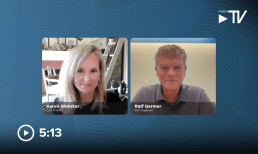Save A Lot, which operates 750 stores across 32 states, introduced its loyalty program, Save A Lot Rewards, through a mobile app that allows members to earn points, or “dots,” for rewards at their local stores.
In an interview with PYMNTS, Katie Kobus, vice president of marketing for Save A Lot, said more customers are using digital channels when shopping and deciding where to shop and what to buy.
“The new Save A Lot Rewards program will help keep the brand top-of-mind for customers in the digital space,” Kobus explained. “It also gives us the opportunity to further integrate our various digital touchpoints — including the savealot.com website, customer emails, social media, and other digital marketing channels.”
This focus on digital engagement aligns with broader consumer trends. According to the PYMNTS Intelligence report, “2024 Global Digital Shopping Index: U.S. Edition,” created in collaboration with Visa Acceptance Solutions, 54% of grocery shoppers expect digital rewards or loyalty programs.
Additionally, streamlined shopping experiences are crucial for creating customer loyalty. The PYMNTS Intelligence report, “The Online Features Driving Consumers to Shop With Brands, Retailers or Marketplaces,” found 40% of shoppers consider how user-friendly a merchant’s online store is when deciding where to shop.
Advertisement: Scroll to Continue
The emphasis on user experience extends to personalized offers, where email remains the preferred method of communication across generations. According to the PYMNTS Intelligence report, “Personalized Offers Are Powerful — but Too Often Off-Base,” email is the preferred method for receiving personalized offers. Sixty-five percent of baby boomers and seniors, 68% of Generation X, 63% of millennials, and 52% of Generation Z indicated they prefer to receive these offers via email.
This understanding of consumer preferences informs the structure of Save A Lot’s loyalty program, which allows independent retailers the flexibility to customize local promotions while maintaining a nationwide framework for redeeming dots for free products, Kobus said. Additionally, the app will feature exclusive coupons and deals.
“Our goal with this program is to provide personalized deals and discounts, giving shoppers added value and even more savings on their grocery purchases,” she explained. “For example, shoppers will get exclusive in-app savings on national brand and Save A Lot’s assortment of private label products, like 99 cent Crystal Falls 24-pack water. Shoppers will also earn dots in the app which can be redeemed for rewards. The loyalty program also allows us to better understand shopper preferences and habits, leading to more tailored and effective promotions in the future.”
Customers can use those dots to redeem rewards, including free products or other exclusive deals. New offers will appear periodically in the “Rewards Marketplace” on the app. In its initial phase, the program will feature promotional offers, such as discounted eggs and water, to entice new and existing customers, Kobus said.
To support this customization, Save A Lot and many of its suppliers will provide core offers available in all stores.
“While Save A Lot and many of our suppliers will supply core offers available in all stores, independent Save A Lot retail partners will have flexibility to customize the app with local offers at the store and market levels to cater to the specific wants and needs of their shoppers,” Kobus explained. “Localized offers can be specific coupons or deals or even redeemable rewards.”
This adaptability is complemented by the insights gained from the new Save A Lot Rewards program, Kobus said.
“The new Save A Lot Rewards program gives us the opportunity to have greater understanding about how our customers shop — how frequently they shop, what they buy, and what products and offers bring them back,” she said.
“We can translate that data into specific recommendations for pricing, promotions, or even assortment that ultimately should improve the customer experience.”




